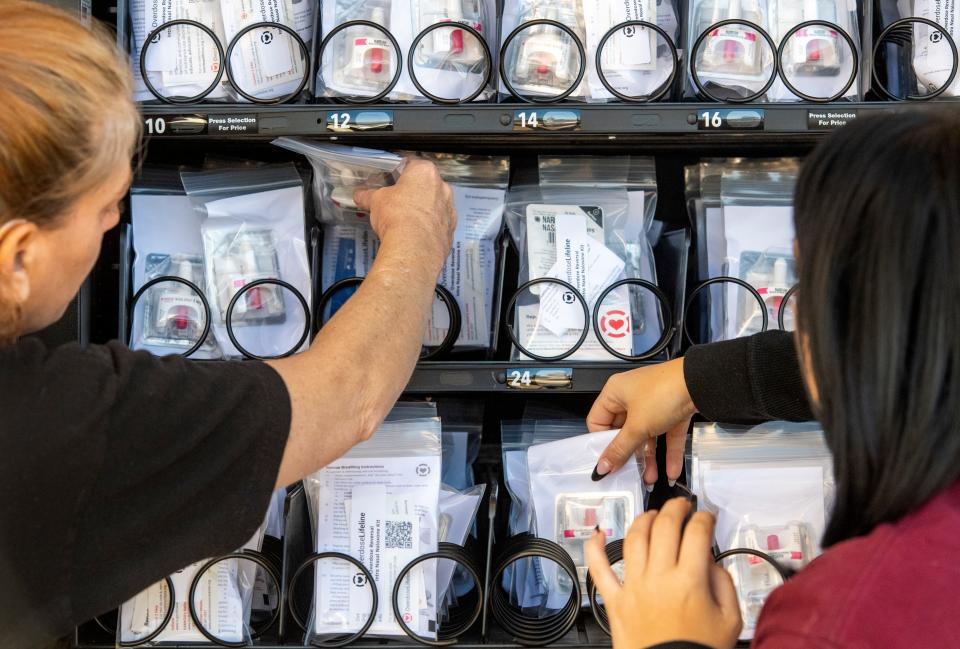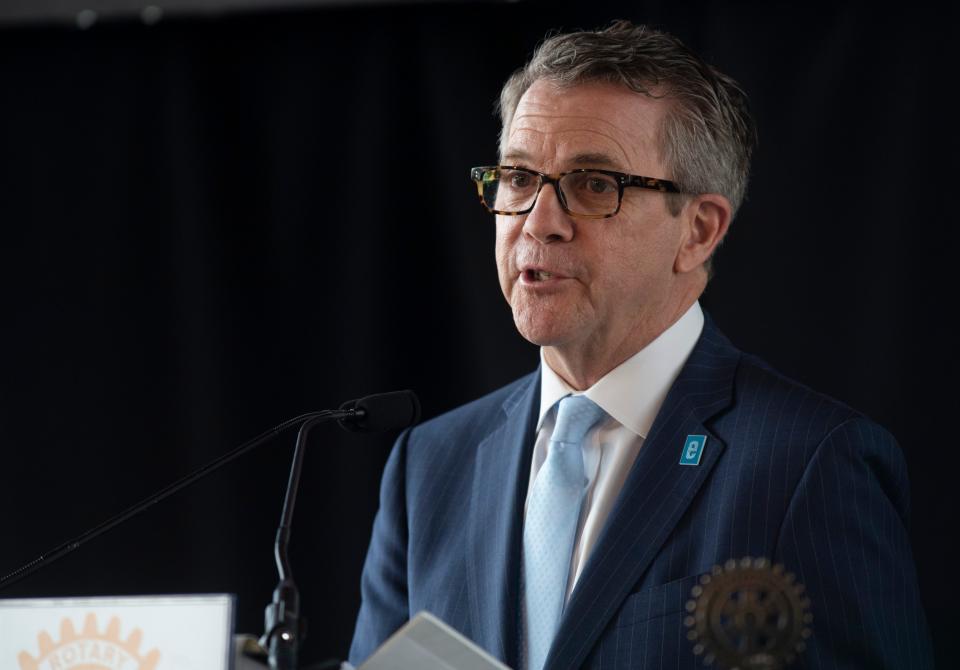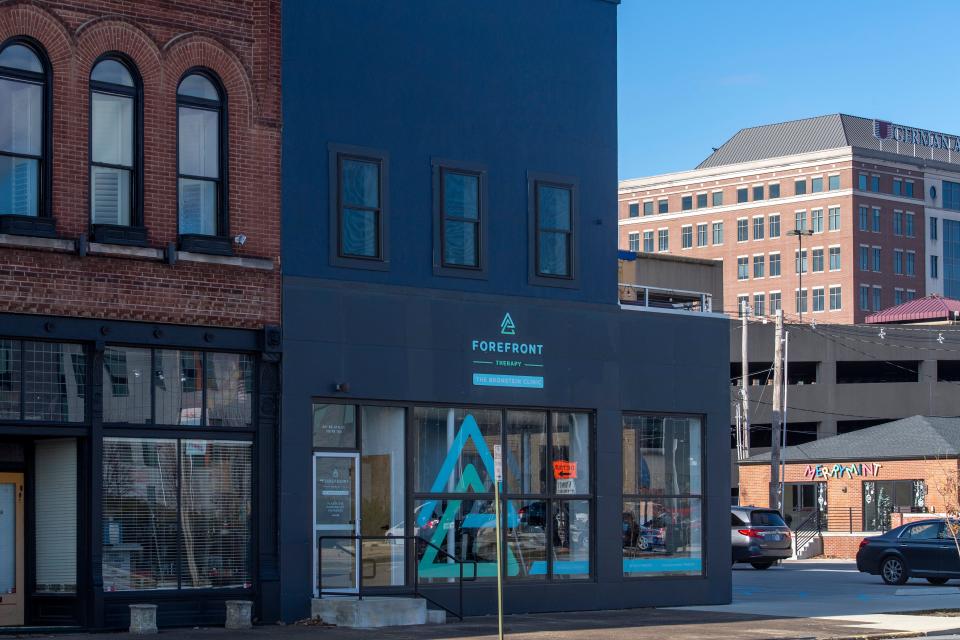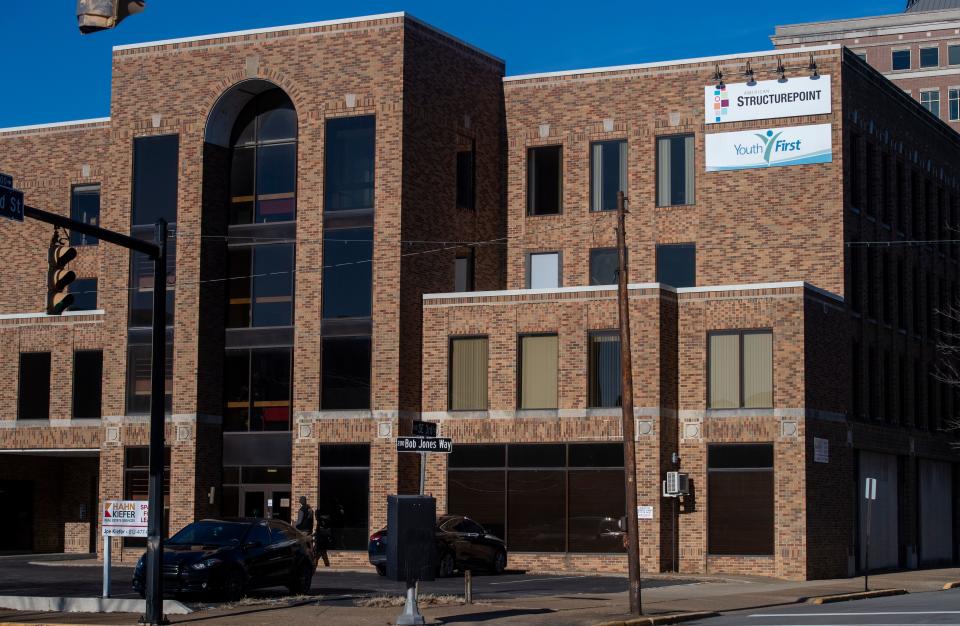Evansville distributed its first batch of opioid settlement funds without seeking proposals
EVANSVILLE — In April, former Evansville Mayor Lloyd Winnecke gave his final State of the City address. At the annual speech, Winnecke confronted a life-or-death issue for Evansville and the country: the opioid epidemic.
“Fentanyl and other opioids are at the heart of many overdoses,” Winnecke said. “Sadly, Evansville is not immune from this national crisis: 77 people died in our community last year from drug overdoses.”
Winnecke then asked a rhetorical question: “How do we reduce that number?”
One way to address the crisis, Winnecke said, would be a creative new partnership between two local organizations, funded by dollars the city received from historic, nation-spanning lawsuits against prescription opioid manufacturers and distributors.
The two local organizations, YouthFirst and Forefront Therapy, say their evidenced-based programs will help prevent opioid misuse and addiction in Evansville through education, occupational and physical therapy, social work, healthcare provider symposiums and other efforts.
But leaders at YouthFirst and Forefront Therapy also said their programs were not designed to provide life-or-death care to persons suffering from active addiction to powerful opioids such as fentanyl, which has become in recent years the primary culprit for fatal opioid overdoses in Evansville and Vanderburgh County, according to a review of coroner’s office data.
The city will receive money from the National Opioid Settlement for 17 years, and it appropriated a total of $645,142 from the first round of funding to facilitate the new partnership.

Forefront Therapy received $387,642 and YouthFirst received $257,000, according to public records. As overdose deaths continue to grip the city and substance abuse leaves a trail of traumatized victims and families in its wake, Evansville is looking to these new programs for much-needed relief.
Evansville did not publicly solicit proposals for how to spend settlement dollars
Unlike in many other Indiana cities, Evansville did not publicly solicit program proposals from local health care providers, non-profit organizations or drug treatment centers, nor did it create a public board or committee to study how best to deploy opioid settlement funds.
“We did not do a request for proposals,” Winnecke told the Courier & Press during an interview at his office. “There was very little guidance given to cities and counties, cities towns and counties, to anyone that got it… I know both of these organizations, and both had raised their hand saying, ‘Hey, you know, how could we be part of this?’ And that’s how it happened.”

By the time Winnecke entered into discussions with YouthFirst and Forefront Therapy, Johns Hopkins University, the RAND Corporation and others had published detailed guides for National Opioid Settlement funding recipients, which in part urged local officials to establish public working groups to study opioid misuse within their respective jurisdictions before soliciting proposals from a variety of potential providers.
Johns Hopkins University and a coalition of 31 professional advocacy groups published nationally recognized guidance for the use of opioid settlement funds in 2021 and identified developing a “fair and transparent process for deciding where to spend the funding” as a key principal public officials should adopt.
“This process should be guided by public health leaders with the active engagement of people and families with lived experience, as well as other key groups,” the guidance states, in part. “Once a jurisdiction has conducted an initial assessment of areas where additional resources would be helpful, it should solicit and integrate broad feedback to design a plan that will meet the needs of the local community.”
Regarding the decision not to formally publish a request for proposals in Evansville, which is a broadly accepted practice when allocating public funds, Winnecke said the city did not want “an influx of, ‘I just need money.’”

“I mean, we wanted thoughtful proposals that we thought could really help move the needle,” Winnecke explained. “That's probably as precise as I can be about what we did, and what we didn't do. I mean, we did not, we didn’t have forums that say, ‘Hey, we've got $941,000 in our first tranche of money, come to us, come forward with your ideas. We did not do that.”
When asked if the city consulted health care providers and other community stakeholders about its use of settlement dollars, Winnecke said informal talks boosted his confidence that YouthFirst and Forefront Therapy were the right organizations to tap, at least for the initial round of funding.
In Indianapolis, the Marion County Coroner’s Office and the city’s office of public health and safety issued a public, data-informed request for community organizations and healthcare providers to submit proposals for settlement funds.
The request, which went live in September, noted that Marion County recorded 810 fatal drug overdoses in 2022, a record high, and stated that the coroner’s office “continues to observe the majority of data to come from the Black and African American communities.”
Organizations were asked to submit proposals addressing “treatment, prevention, recovery, harm reduction, youth and community education, and efforts to reduce barriers that affect the community’s ability to access treatment.”
No such formal request for ideas on how best to deploy settlement dollars occurred in Evansville, though Winnecke said potential funding recipients were widely aware of the settlement and knew how to offer ideas.
In West Lafayette, officials established a committee to evaluate how best to deploy opioid settlement funds there, which is in line with guidance from Johns Hopkins University and the National Association of Counties.
David Sanders, a West Lafayette city councilman, told the Courier & Press he was stunned Evansville, which is Indiana’s third-largest city, did not publish a public request for proposals regarding the opioid settlement funding.
“It’s all on the basis of a request for proposals,” Sanders said of West Lafayette’s efforts, which the city is coordinating in conjunction with Tippecanoe County. “We have a committee. The mayor is not making this decision here… We’re definitely taking a multi-valent, proactive approach, which is community based and community informed.”
Aside from YouthFirst and Forefront Therapy, at least one other local group expressed an interest in offering services related to Evansville’s receipt of National Opioid Settlement funds.
Public email records show the Evansville Recovery Alliance, a non-profit advocacy organization, emailed Winnecke on Dec. 15, 2022, to state it was on the “lookout” for city and county plans related to the use of opioid settlement dollars.
“Please let us know how best we can follow and participate in the allocation and fulfillment of the purpose of this settlement in Evansville and Vanderburgh Co.,” Lavender Timmons, the organization’s executive director, wrote in the email.
Timmons told the Courier & Press she and an ERA board member met with Winnecke soon after, during which she presented him with printed copies of guidance related to the use of settlement funding. But the meeting did not lead to further discussions.
In the year since, the ERA has partnered with the Vanderburgh County Sheriff’s Office to provide Narcan, a drug that can reverse opioid overdoses, to persons released from the jail.
The ERA says it has distributed more than 10,000 doses of Narcan across Evansville at free vending machines, at public overdose rescue kits and by delivering it directly to people who are at risk of suffering an overdose.
Timmons questioned why Evansville had not set up a public panel or committee to evaluate future opioid settlement funding allocations and noted that grassroots organizations like ERA often have to fight for even meager funding.
“How would organizations even know to request (funding) unless they've been tracking this specific fund?” Timmons asked. “We find inspiration in our community and the people that need us. But it would have been such a relief from the financial strain to be supported by such a fund, a fund that was meant for groups like us.”
Winnecke said his office never received credible proposals from organizations besides YouthFirst and Forefront Therapy that he was comfortable pursuing.

“I’d had discussions with other people, but nothing really materialized,” Winnecke said. “If people have definitive ideas on how they can utilize (funding) that fits one of the criteria, we’re certainly open to it.”
After more than 10 years in office, Winnecke opted not to run for mayor in 2023, and in January, Democrat Stephanie Terry was officially inaugurated as the first woman and person of color to hold the city’s highest office.
Terry has not publicly stated what plans her administration has for National Opioid Settlement dollars moving forward.
Forefront Therapy and YouthFirst say evidence-based programs will save lives and combat opioid epidemic
Attached to Timmons’ email to Winnecke was a RAND Corporation document titled, “Strategies for Effectively Allocating Opioid Settlement funds.”
Among the recommended strategies identified by the RAND Corporation were preventative approaches aimed at reducing adolescent and adult exposure to prescription opioids, which Forefront Therapy and YouthFirst said its programming will target.
Forefront Therapy co-owners Dr. Ryan Woods and Dr. Jessica Woods, and YouthFirst President and CEO Parri Black, are confident their programming will make a serious dent in the region’s opioid and substance abuse crisis, and they noted that their services will be offered alongside the region’s existing drug treatment options, which include in-patient and medication-assisted treatments.
“It’s both prevention, intervention and sustainability models,” Ryan Woods said of Forefront Therapy’s approach. “We’re looking at it from a preventative model… Because we can either keep providing back-dated interventions or we can get ahead of it and educate (and) really create, hopefully, lasting change.”
Forefront Therapy operates multiple clinics in Evansville, including the non-profit Bronstein Clinic, and offers reduced-cost services to people who may be uninsured or would otherwise struggle to pay for treatment. Forefront provides physical, occupational and speech therapy to Tri-State Area patients.
It’s public mission statement says Forefront aims to “be the leader of therapy and wellness services and provide the best standard of care, research and education to a diverse community.”
Woods said Forefront has conducted opioid provider symposiums to educate area doctors about non-opioid treatment options to combat the opioid epidemic, and it will use a portion of its settlement dollars to conduct additional symposiums.
Physical therapy and education are at the core of Forefront’s strategy to address opioid use and misuse, according to Wood. Forefront staff will, for example, help reduce the need for injured persons, particularly adolescents, to take prescription opioids by treating the root injury through multidisciplinary, evidenced-based therapies.
Researchers have identified physical therapy as a critical tool in the fight against opioid addiction. Advocates and medical associations have, for years, fought to expand access to physical therapy treatments for musculoskeletal pain, which is the diagnosis most commonly associated with a person receiving prescription opioids.
In addition to provider symposiums and therapeutic interventions, Forefront will use a portion of its settlement funding to conduct new research into how the treatment models pursued by itself and YouthFirst make an impact locally.
Jessica Woods said she will help direct Forefront programming that is tailored to address the needs of mothers with substance use disorders and the needs of children born with neonatal abstinence syndrome.
YouthFirst, according to Black, will use its share of the funding to expand services that help equip adolescents with the “skills, the knowledge and the motivation to avoid going down this path, or if they are already experimenting, to come back and back away from it.”
YouthFirst’s roots trace back to the mid-1990s when Dr. William Wooten, a local addiction medicine specialist, questioned whether Evansville had employed effective drug abuse prevention strategies.
“He rallied key community leaders to figure out what could and should be done,” YouthFirst’s website states. “The process of seeking solutions led to the 1998 creation of Youth First, Inc., a not-for-profit agency with a mission to strengthen youth and families by providing evidence-based programs that prevent substance abuse, promote healthy behaviors, and maximize student success.”
One such program that settlement dollars could help expand is YouthFirst’s in-school Reconnecting Youth class. Teresa Mercer, a YouthFirst social worker who’s led the class for decades, said it offers a much-needed space for youths who are at risk of developing substance use and other disorders.
“It's a very small class that focuses really on improving coping skills and decreasing harmful behaviors, which is going to include substance use,” Mercer explained. “You're there to support their mental health… which includes a variety of factors for young people today.”
Desirae Nefi, who in December was finishing up Ivy Tech’s EMT program, said Reconnecting Youth and Mercer, who served as her course instructor and mentor at Wood Memorial in Gibson County, served as a bedrock of stability when her life was upended at a young age. Nefi estimated she first met Mercer when she was 10 or 11 years old in just the fifth or sixth grade.
“My mom had just gotten out of a coma and all that fun stuff,” Nefi said. “And I was like, I need another adult. So yeah, we go way back.”
Nefi’s mother suffered from Crohn’s disease and spent months in a hospital recovering after she was placed into a medically induced coma. Nefi said the whole experience left her traumatized as a 10-year-old who bore responsibilities such as taking care of her 6-week-old baby brother.
“It was a lot to put on a little (kid's) shoulders,” Nefi recalled. “And that’s how I met her (Mercer), because I needed to reach out to somebody.”
Mercer still remembers meeting Nefi at Wood Memorial, and she couldn’t believe Nefi was so young, saying “she was like a 13-year-old in an 11-year-old’s body.” Mercer took up talking Nefi and soon became an adult outlet where Nefi could “vent” on free periods at school.
The pair stayed in touch, and when “everything kind of hit the fan” in Nefi’s sophomore year of high school, she wound up in Mercer’ Reconnecting Youth Class. “We called it the Breakfast Club,” Nefi joked.
But the class of 10 to 12 students played a pivotal role in preventing Nefi from travelling down a path of addiction and destruction as she coped with upheavals across her family and home life.
“We were holding ourselves accountable by you know, journaling our usage and striving just to be like 1% better every day,” Nefi said. “And so (Mercer) gave us a lot of tools, a lot of different therapeutic techniques to like, ease all of us at the time.”
Mercer, who now offers the Reconnecting Youth class at Reitz High School in Evansville, said she and other YouthFirst social workers strive to help at-risk children learn the life and coping skills necessary to avoid traveling down a path that could disrupt their lives in the here and now or in the future, particularly when it comes to substance use and abuse.
“It's good for the people who use to hear the other side who say, ‘I've never even thought about using,’” Mercer said of how the Reconnecting Youth program encourages dialogue among students. “And then the people that don’t use, they learn a lot from the people who do use, and it's interesting to see the feedback… I want to be able to help them and try to understand what's going on there and be there for them.”
Settlement funds will help YouthFirst hire and retain more social workers like Mercer, Black said, and will help YouthFirst and Forefront Therapy better study and understand how their work helps prevent substance abuse locally over time.
Nefi credits YouthFirst with helping her get to where she is now, working as a nurse’s assistant and shaping up to become an Emergency Medical Technician – like the ones who rushed in to help her mother when she was just a little kid.
“I feel like getting into the healthcare field as an adult is my way of kind of repaying my community that I grew up in and survived,” Nefi explained. “I'd like to be the first person there, I think, given everything that I've been through. All the skills that I've picked up with this program have especially set me up for a good future in this career, too.”
Data shows promising trend: Overdose deaths dropped over the past two years locally
In 2021, Vanderburgh County Coroner Steve Lockyear’s office recorded 106 drug overdose deaths across Evansville and Vanderburgh County, up from 67 just the year before. Overdoses involving fentanyl or heroin spiked from 41 in 2020 to 61 the next year.
But Lockyear logged a promising trend beginning in 2022: The number of fatal overdoses declined more than 27% that year, and data shows deadly overdoses kept dropping in 2023 to about 50 total, the lowest number in recent years.
In December, Lockyear told WFIE-NBC 14 that the decline could in large part be credited to community efforts to distribute free Narcan to people most at risk of suffering a fatal overdose.
“I do know that the fire department and law enforcement are saving a lot of people, so dispensing Narcan has saved lives,” Lockyear told the television station.
Timmons said she had already reached out to Terry’s new administration about settlement funds and the potential to establish a committee to study the opioid crisis locally. She hopes settlement dollars, even just $5,000 or $10,000, will be allocated in the future to boost Evansville’s supply of free Narcan.
“It’s one of the tools we know works and saves lives immediately,” Timmons said.
This article originally appeared on Evansville Courier & Press: How is Evansville using its National Opioid Settlement money?

